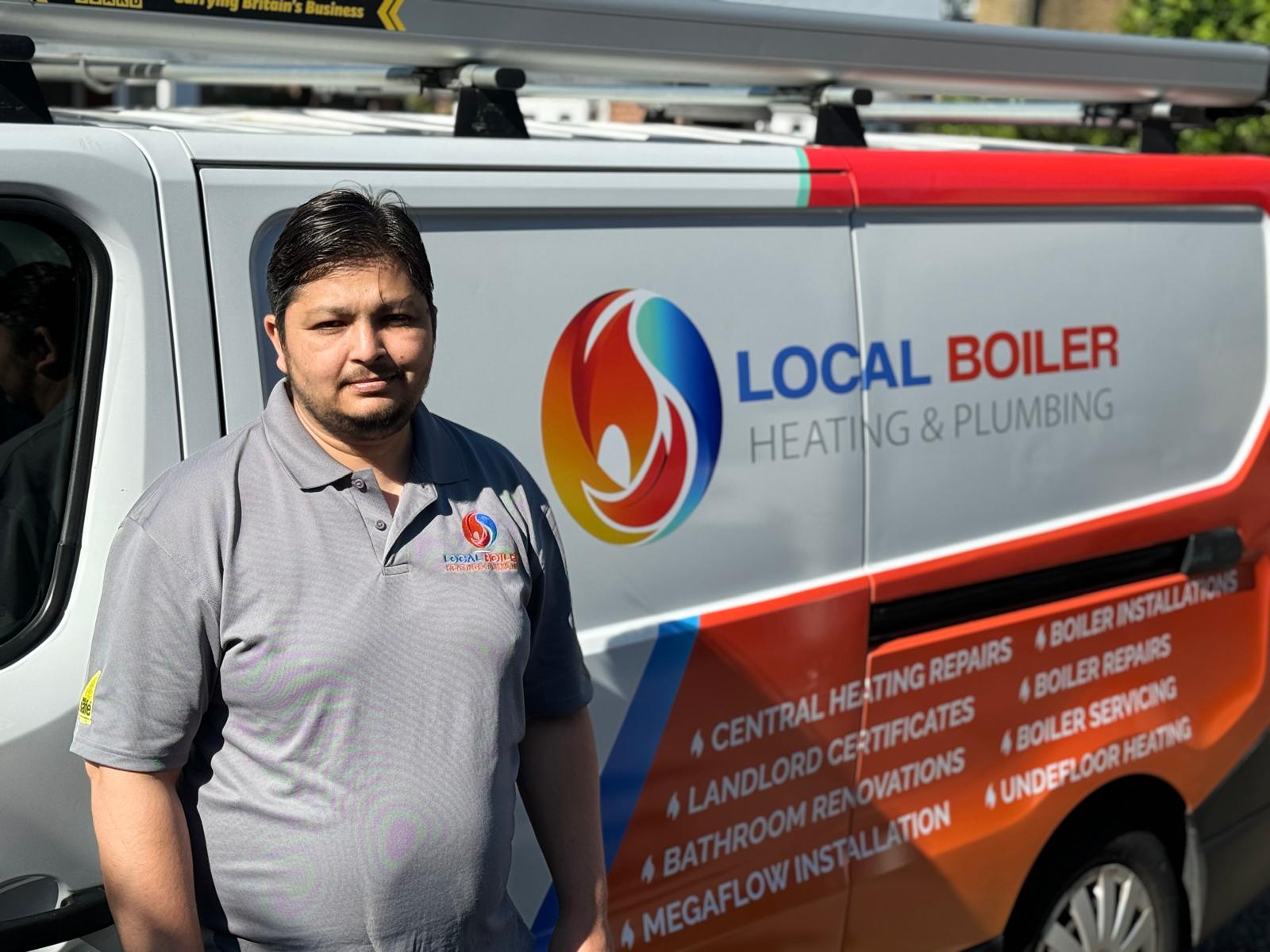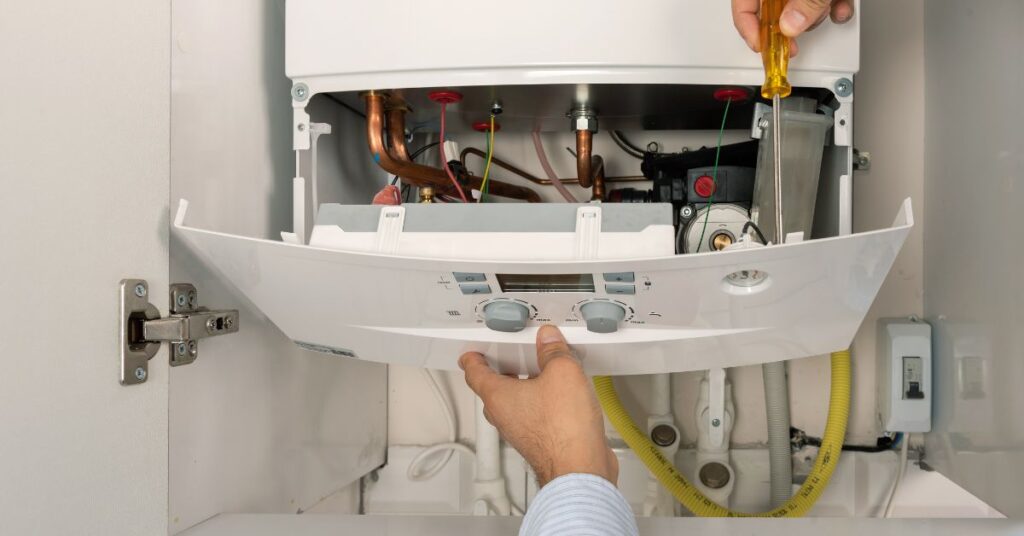Introduction
If you live in London and are suddenly experiencing low shower pressure, chances are it’s your combi boiler that’s the issue. This type of compact unit is popular in urban homes and apartments because it’s space-saving and economical. However, one of its downsides is that combi boilers often fail to provide sufficient water pressure for showers.
Our ultimate comprehensive guide covers all common reasons why combi boilers lose pressure, how to fix the problem yourself, when to call a boiler engineer, and long-term solutions. Whether you’re a homeowner, renter, or landlord, this information will help you spend less time, money, and frustration on shower pressure issues.
How a Combi Boiler Works and Why It’s Responsible for Water Pressure
A combi boiler (or combination boiler) is a type of boiler system that does not require a hot water cylinder and separate storage tank.
As its name suggests, it combines water heating and central heating in one unit. The hot water is heated directly from the mains as needed.
The cold water mains supply enters the combi boiler and passes through a heat exchanger, which instantly heats the water.
This means that there is no tank where hot water is stored—it is constantly produced on demand.
The combi boiler heats water directly from the mains; therefore, its performance is entirely dependent on the mains water pressure. It means that the water pressure in your shower or bath is the responsibility of your boiler and water supply.
Combi boilers are a popular choice in London due to their space-saving and energy-efficient features. No need for bulky hot water cylinders or storage tanks—ideal for small flats and houses with limited space.
The downside is that when there is a problem with your mains or boiler, there is nothing to buffer it. If the mains supply pressure drops or the boiler develops an issue, your shower pressure will drop immediately.
Common Reasons for Low Shower Pressure in a Combi Boiler
The following are the most common causes for low shower pressure with a combi boiler.
1 Low Water Pressure from the Mains
Occasionally, homes in London experience fluctuations in mains water pressure. It can be caused by times of peak demand (rush hours in the morning and evening).
If the mains water pressure entering your house is low, there is nothing your combi boiler can do about it.
DIY Test: Run the cold kitchen tap and measure the flow rate. If it’s low, then it’s a water mains issue, not a boiler fault.
2 Boiler Pressure Is Not Set Correctly
Ideally, a combi boiler should be set to 1.0–1.5 bar when cold.
If your boiler pressure gauge reads below 1.0 bar, it indicates that your heating system has insufficient pressure to provide a strong shower flow.
DIY Fix: Re-pressurise the boiler using the filling loop (avoid over-pressurising above 2.5 bar).
3 Blocked Showerhead or Limescale Buildup
Limescale is a common problem for homeowners and renters in London, primarily due to the hard water in this region.
Mineral buildup narrows showerheads over time, weakening the water flow.
Fix: Soak the showerhead in white vinegar overnight or use a proprietary limescale remover.
4 Faulty Boiler Parts
- Pressure Relief Valve (PRV): A stuck-open pressure relief valve will allow pressure to leak.
- Diaphragm Failure: A faulty or damaged diaphragm prevents the boiler from building up the necessary pressure.
- Pump Failure: While combi boilers operate from the mains, some internal pumps help regulate the flow of water. If the pump is damaged or worn out, it will not function properly.
5 Multiple Showers or Taps Running at Once
Combi boilers are designed to run one shower or tap at a time. They cannot boost water flow if the shower and multiple other hot water outlets (such as taps and appliances) are running simultaneously.
If your shower pressure only drops when your washing machine or dishwasher is running, or your neighbour is taking a shower upstairs, the problem is that the boiler can’t increase the flow rate fast enough.
Step-by-Step Troubleshooting for Homeowners
Before you get the local London boiler engineer to call out, do a quick check of the following things:
1 Check Boiler Pressure Gauge
Your combi boiler pressure should be set at 1–1.5 bar when cold. If it is lower, re-pressurise the boiler through the filling loop.
2 Check Mains Cold Water Flow Rate
Run your cold kitchen tap to check the flow. If it’s poor, it’s a water mains issue. Contact your local water company to report the problem.
3 Inspect Showerhead and Hoses
Clean the showerhead of limescale and replace it if damaged. Check any exposed hoses for leaks and replace if necessary.
4 Bleed Radiators
Air trapped in the heating system can affect overall boiler performance.
5 Check for Leaks Around Boiler
Leaks, even small ones, can reduce pressure over time. Look for visible signs of water or regularly damp spots.
When to Call a Professional Boiler Engineer
The following are issues that require an engineer to fix:
- Recurring Pressure Loss – Indicates a potential leak in the system.
- Faulty Expansion Vessel – A Gas Safe registered boiler company is needed for replacement or recharging.
- Persistent Low Mains Pressure – If the issue doesn’t improve after reporting it to your water supplier, you may need a water booster pump or an accumulator tank.
- Boiler Error Codes – Digital combi boilers show specific fault codes (e.g., F22 for low pressure in Vaillant boilers).
Tip: Always use a Gas Safe-registered local boiler company in London for any boiler repairs or maintenance. Don’t attempt any DIY gas work yourself, as it is illegal and unsafe.
How Local Boiler Companies in London Fix Shower Pressure Problems
As a London homeowner, you can try the DIY fixes we have mentioned above. However, if you are a tenant or prefer not to do it yourself, consider calling a local London boiler engineer to resolve the issue.
There are dozens of local boiler companies in London that specialise in combi boilers and see these issues every day.
Here are some common ways they fix combi boiler shower pressure problems:
1 System Re-pressurisation & Leak Detection
The engineer will re-pressurise your combi boiler and then trace any hidden leaks in the pipework or radiators.
2 Replacing Faulty Components
If a part is faulty, it will be replaced (expansion vessel, PRV, pump).
3 Installing a Shower Pump
It can help increase water flow, but only if it is compatible with a combi boiler (designed for mains boosting).
4 Fitting a Mains Water Accumulator
Stores mains water under pressure and provides a reserve for your shower to help maintain a steady performance.
5 Powerflushing the System
Helps remove sludge, debris, and lime scale deposits from pipes.
London-Specific Factors That Impact Boiler Pressure
- Hard Water: Limescale is a more significant problem in London than in most other areas of the UK.
- High-Rise Buildings: Water pressure often suffers on higher floors.
- Older Plumbing: Narrow pipes and corroded fittings are more common in Victorian-era properties.
- Regulatory Factors: Boiler work must comply with Gas Safe and UK Building Regulations.
Long-Term Solutions
If your combi boiler constantly fails to give good shower pressure, there are a few long-term solutions:
- Upgrade to Higher kW Boiler – More powerful boilers are better at coping with higher flow rates.
- Install a Shower Pump – This can be used with combi boilers if the correct type (mains-boosting) is selected.
- Switch to a System Boiler (with Cylinder) – Suitable for larger homes with several bathrooms.
- Install a Water Softener – Helps prevent/minimise limescale buildup, extending boiler life.
Preventive Maintenance Checklist
- Annual boiler servicing (required for warranty).
- Descalcify showerheads every 2–3 months.
- Check the boiler pressure gauge regularly.
- Flush system every 5–7 years.
- Replace any worn washers and valves promptly to ensure optimal performance.
Cost of Repairing Combi Boiler Pressure Issues in London
- Boiler Re-pressurisation (DIY): Free
- Engineer call-out charge: £80–£120
- Expansion vessel replacement: £150–£300
- Shower pump installation: £250–£500
- New combi boiler: £1,800–£3,000 (inc. installation)
Also Check: – Combi boiler vs system boiler
Conclusion
Low shower pressure from a combi boiler is a common problem in London houses and flats. But it doesn’t necessarily mean that you need to replace the boiler. It could be as simple as re-pressurising or descaling showerheads, or it might require a booster pump or system upgrade.
If DIY checks don’t reveal the problem or you don’t want to do it yourself, the safest and most cost-effective solution is to call a local boiler company in London. They work with combi boilers all day, every day, and will have encountered these issues before—they know what to look for and how to resolve them.
Frequently Asked Questions
Q1: Is it safe to re-pressurise my combi boiler myself?
Yes, if you follow the manufacturer’s instructions in your boiler manual. Never exceed 2.5 bar of pressure.
Q2: Why does the pressure keep dropping after I top it up?
This is usually a sign of a leak in the system or a faulty expansion vessel. You should call a professional to repair it.
Q3: Can my combi boiler run two showers simultaneously?
Most combi boilers are designed to serve only one shower or tap at a time. You would need a very high kW model to run two showers (35kW+).
Q4: Will a water softener help my shower pressure?
Indirectly, by reducing/minimising limescale deposits in pipes and showerheads.

Sunny Saini is a certified heating engineer with over 15 years of experience in maintaining and repairing boilers. He specializes in diagnosing complex boiler issues and providing reliable solutions to ensure homeowners stay warm and comfortable throughout the year.





![]=](https://localboiler.co.uk/wp-content/uploads/2024/05/Untitled-design-96-300x300.jpg)